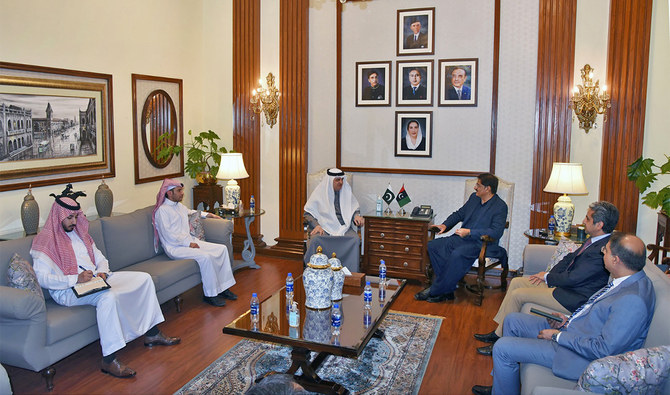ISLAMABAD: Saudi Arabia has offered “full cooperation” to the government of Pakistan’s southern Sindh province with the reconstruction work in the wake of the devastating monsoon floods last year, said a statement issued by chief minister’s office in Karachi on Thursday.
The top Saudi diplomat in Pakistan reiterated the kingdom’s support to the province after a conference under the title “Resilient Sindh: From Pledges to Reconstruction.” The event was organized by the provincial administration as a follow-up to a donors’ conference in Geneva last month where Saudi officials offered to contribute $1 billion to help Pakistan with its post-flood situation.
Ambassador Nawaf bin Said Al-Malki held a meeting with Chief Minister Murad Ali Shah after the conference wherein he was briefed about the priorities of the provincial administration.
“The chief minister told the Saudi envoy that rebuilding people’s houses and restoring agriculture and irrigation were major challenges currently facing the province,” said the official statement released after the meeting. “The Saudi ambassador congratulated the chief minister for organizing a successful donors’ conference and assured him of the kingdom’s full cooperation for the rehabilitation of flood affected people.”
Pakistan’s southern Sindh and Balochistan provinces experienced massive devastation in the wake of unprecedented monsoon rains last year that triggered flash floods destroyed houses, farmlands, and public infrastructure.
According to official estimates, the floods killed over 1,700 people while affecting the lives of nearly 33 million. Since then, the country has sought international financial assistance to deal with the issue while enlisting the United Nations support.
Pakistan also has strong political, cultural, economic, and defense ties with Saudi Arabia which is home to more than 2.5 million Pakistani expatriates and a key source of remittances and oil supply to the country.
Last week, KSRelief, the kingdom’s humanitarian arm, launched the third distribution phase of 25,000 non-food items (NFI) and an equal number of relief kits to help over 350,000 flood affected people in Pakistan.












